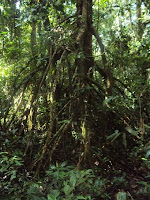
Established in 1983 and covering 1800 sq kms, Sapo National Park is the country’s largest and only protected area of rainforest. With the nearest clinic a three hour walk away, it’s not yet a tourist hotspot. In fact, many areas of the park are even too dangerous for the park wardens to patrol let alone for tourists to visit. Illegal mining and hunting have thrived since the end of the war in 2003.
Over the years, people have migrated to the park forming mini towns with names like Afghanistan, Iraq, America and Beirut. They’ve built homes and communities, relying on women from nearby towns to bring them food and fuel. They bribe local town chiefs to let them use their villages as access points into the park. It’s not known how many people are illegally living there but one recent police survey found there were around eleven thousand in just one area. The NGO, Fauna and Flora International, says there could be as many as twenty thousand in the park. That's more, even more than during the 14 years of civil war where many people fled to the park for safety. It’s now doing outreach work in the communities, educating people about the importance of the forest, the environment and the many species that can only be found in this part of the world.
Below is an interview with Alphonso Gboyee, a former illegal hunter who now works for FFI.
 What do you do on a day to day basis?
What do you do on a day to day basis?My job in the park involves bi-monitoring of animals in the park. I’m the chief commander. I monitor the animals’ activity and also identify species. For example different types of Duikers, monkeys and birds. I have my data sheet and fill in everything I find.
You were an illegal hunter before this job?
Yes, I was a hunter before. My friends talked to me, saying I should leave hunting. I studied their advice and agreed. I want my children to see the species in the forest and the trees, at least so they can talk about the park.
But you got much more money as a hunter?
Yes I got much more. If I took my gun into the forest, I could kill 25 Duikers and would make more than 10,000 Liberian Dollars ($US 143) in one day. For the work I’m doing now, I get $US 40 a month. So if I take one day hunting, my monthly wage looks very small. But for me, I would just lavish the money but and not appreciate it. If you sweat for your money you have to think about how you use it and you respect it more.
What sort of prices would you get for an animal?
A Black Duiker goes for around 1200 LD. Other Duikers can go for around 600 LD, but a Chicken Duiker can go for around 4000/5000 LD. The most expensive animal I hunted was a buffalo. I would get around 12000 LD for that. I got around 10000 LD for a zebra.
How can you persuade others hunters to stop?
The same way my friends persuaded me. I tell them about the importance of the park and how tourists will one day come and enjoy the park. I tell them about the medicinal properties of the plants and how they should just leave the park alone. Our children need to see the animals living.
What are the problems you’re face in your job at the moment?
We are managing the park but there are people who bring illegal activity in the park. They’re mainly in the North East of the park and it’s just too dangerous for us to go into. There are illegal miners and illegal hunters and we also have some people making coal in the park. The park was established in 1983. The forest has been set aside as a National Park and no one should be in the park killing our species or mining. They are going against our laws. The work they’re doing there is illegal and also the park just isn’t safe for people to visit and even for us to work.
Have you come face to face with them before?
Last November I was bi-monitorring in the north east of the park. It was about a seven hour walk from the town. There were four of us and we met some hunters/ miners and asked them what they were doing here. They asked us where we came from and I said we came here to work and monitor the animals. Then they told me not to cross Sinoe River to enter the park. I asked them why and they said the forest trucks came into the bush and damaged their tents so if any of us came into the forest they’ll steal our belongings, beat us and make us go back. There were only four of us. We had no weopans and we feared for our lives. There were six of them with guns and threatened to kill us. So we retreated back to the town.
What do you think needs to happen?
Well, these people are not above the law. They’re violating Liberia’s laws. We want to see justice. They need to be removed immediately. It’s embarrassing our job.


















